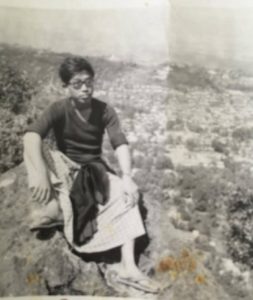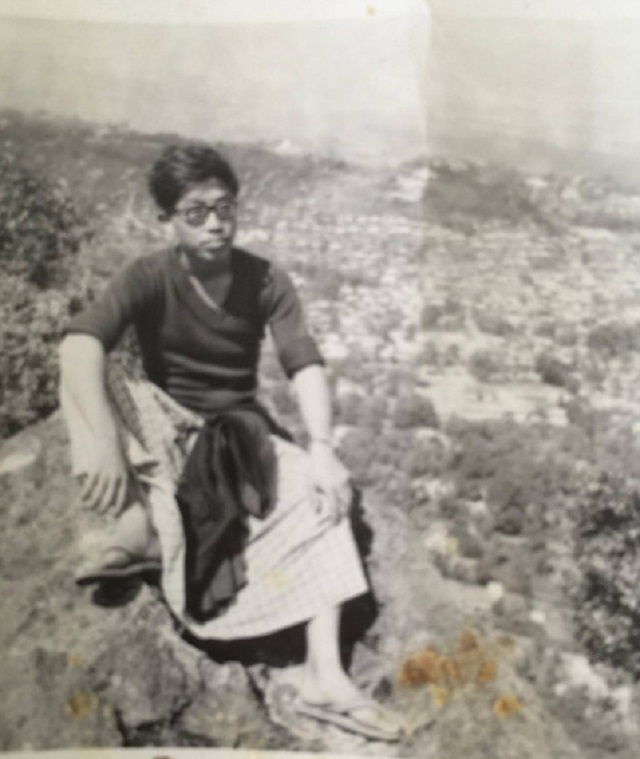Yes, I know. These days it is hard to believe I used to be one of the noted Burmese song writers. That I used to speak Burmese more fluently than Shan. That I used to love wearing Burmese longyis than pants.
When I got back to Taunggyi last April to attend a reunion of my extended family, my cousins, nephews and nieces were not only surprised, but also dismayed to find out that I couldn’t even remember my own songs. “I remember every song you wrote,” said a cousin, who in fact sang for me when I was asked to sing a song.
It wasn’t like that when I moved from lower Burma back to Shan State in 1954. My father who had participated in demonstrations against feudalist Saofas (Sawbwas) had fled to join the First Shan Rifles, formed after Independence under the leadership of Gen Tin Tut, who had worked with Aung San when he came to Panglong in 1947 to participate in the conference that culminated in the signing of the historic treaty.
I was six years old and spoke Shan only with my grandfather and neighbors. Among us brothers and sisters (actually cousins, as all our parents had left us in the care of our widowed grandfather), who had all been brought up in Burma Proper, the lingua franca among us was Burmese. We all read Burmese novels, sang Burmese songs and dressed like Burmese do.
In 1962, following the coup, we moved to Taunggyi where I was reunited with my parents. My father had left the Burma Army, after he, along with his company, was removed from the Shan Rifles to another unit, and spent years being transferred from one place to another. I was 14 that year and, what’s more, I was in love — or thought I was, after reading so many romances written by Burmese authors like Tetkatho Phone Naing, who later became the head of the Taunggyi College, where I attended it in 1966. And like every teenager in love, I was desperately in need of an outlet for my pent-up emotions. And I started to write songs in Burmese. (Took me 4 years to produce the first song)
All in all, I was on my way to becoming a Burman. Without shame. Or without regret.
Then, like most stories in books, disaster struck in the form of a directive from U Tin Ko Ko, said to be a Shan from Pyinmana (Burmese corruption of Piang Mark-na, meaning The Plain of Myrobalan), and appointed by the coup leader Gen Ne Win as a member of the Shan State Executive Council responsible for education. He wanted to continue the Shan language classes, twice a week, and, to my horror, he wanted all male students, both Shans and non-Shans alike, to wear Shan pants to school.
Yes, I remember I didn’t like it at all. Why should I learn Shan? Has it become an official language in Shan State? (It hadn’t) What good will come out of it by learning it? Such a waste of time.
It was the same sentiments with wearing pants. I thought longyis were more convenient for us males on any occasion. What’s more, it’s cheaper. On the contrary, the baggy Shan pants were really annoying, especially when you have to go to toilet, to relieve yourself, unlike the longyi, which all you have to do is to lift the part of it that you need to.
My disgust of the Shan pants reached its zenith the morning when I was cycling to school and came across the girl I had taken a shine on. I thought about chatting with her and if she’s interested, which I was sure she was, would ask to sit on my bicycle’s backseat to school.

I softly called her name and when she turned her head to look at me, I stopped the bike and lowered my left feet to the ground. Unfortunately, my foot never reached it. My pants were caught in the pedal, and I went crashing down to the ground, with the bicycle on top.
Students then rushed to help me. Someone lifted the bicycle off my back. Another picked up my glasses and handed them back. And everyone was laughing. I was hurt. Moreover my youthful pride was hurt. And I vowed to myself aloud, “I’m not going to be a Shan, ever!”
The vow, like New Year’s resolutions, did not last long.
Halfway through the next academic year, the report came that U Tin Ko Ko had been stripped of his positions and detained. Next came the new directive from the education department: From now on, all male students shall no more wear Shan pants to school, but only longyis. And, what’s more, no more Shan classes.
By all accounts, I should have been happy about the whole affair. Figuratively speaking, hadn’t both of my prayers been answered?
But, to my own surprise, I was starting to ask questions:
- Hey, what’s wrong with wearing pants? Is it a crime to dress like a Shan coming to school?
- And what about not having to learn Shan? What’s wrong with a Shan learning Shan? More than that, if it’s all right for non-Burmans to learn Burmese, why shouldn’t non-Shans learn Shan, especially when they are in Shan State?
I was young. I was rebellious. Maybe we Shans have some blood akin to the Italians I read in one of Readers’ Digest funny stories, which goes something like this:
An ocean liner carrying international businessmen holding a business convention is about to sink mid-ocean. The captain calls his chief mate and orders him to inform the passagers that they have to escape by lifeboats now.
After a while, the chief mate returns and informs the captain everyone is refusing to leave. The captain listens and orders him to wait for him at the bridge and goes out. A few minutes later, he is back and tells the mate they are the only people left on the ship and they have to move fast before the ship goes down. The mate asks him how he had pulled it off. And he answers:
“It’s easy. With the British, I told them it’s sporting to abandon ship. They went right off.
With the French, I said its chic and elegant to leave the ship. They happily went away.
With Germans, I told them it’s an order. They obeyed.
With Italians, I said they were not allowed to leave the ship, so they went.
Mate: What about the Americans? What did you tell them?
Captain: Simple. I informed them they were insured.
Anyway, from then on, I started to learn Shan outside school hours and started wearing Shan pants, at every opportunity offered. To spite the rulers, if not for anything else.
Which started me on the road to politics and in due course rebellion.
In 1983, when I was appointed as a representative to visit the Karen National Union (KNU), my Burmese had become so rusty that I had to ask for an officer who was more at home with the language to prompt me whenever I found myself at a loss for words.
It took me another 15 years to find out what went wrong.
In 1998, I was at a seminar in Chiangmai, where representatives from different branches of Tai, which includes Shan, Thai, Laotians, Ahom, Leu (Lu), Yon (Muang), and Kheun (Khun), among others, met.
During the break, I had a chance to talk to the Leu representative from Sipsawngpanna (Xixuangbanna, China), whom I told:
“I really envy your situation.”
Tai Leu: Why?
I: Because the Chinese government is not only allowing you to learn Tai, but also encouraging and supporting it. The same goes for your efforts to preserve and promote your culture. I wish we in Burma are enjoying the same rights.
Tai Leu: You may be right. But, on the contrary, we too feel envious of your situation.”
I: (Surprised) How is that?
Tai Leu: Of course, you know the Tai saying:
The fish lives when the water is hot.
The fish dies when the water is cold.
(Nam Hawn Pa Pen, Nam Yen Pa Tai)
You Shans are living under suppression, like a fish in hot water. You therefore do everything to survive. So your literature and culture live on. However, we Tai Leu, bestowed freedom by the Chinese government to preserve, promote and propagate our literature and culture, face a bigger opponent – our own youth. Given a choice between Tai and Chinese literatures and cultures, they are not interested in their own heritage anymore. To them, the choice is to go the Chinese way. Had our literature and culture been suppressed and strangled like you are, these young people would have been easier to convince.
Since then, I have never stopped wondering: Had successive Burmese governments been as enlightened and magnanimous with the upkeep of Shan literature and culture, like the Chinese government is, would I still choose to be Shan?












Leave a Comments